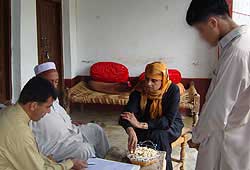Defusing Human Bombs

The shouts and laughter of boys playing games fills up the hidden away in a remote valley near Swat Pakistan. With their green and red school uniforms, these boys and seem like any other school children. But there is no other school quite like this in the world, where most of its pupils were expected to die before they reached adulthood.
Even though director Asad Qureshi had been recently kidnapped by the Taliban, he and producer Ahmed Jamal decided to head back to Pakistan in September 2009. They spent the next 18 months filming ‘Defusing Human Bombs’ which shows the school’s attempts to undo years of Taliban indoctrination and violence, and give them hope for their future. After months and years of schooling, reformation and counselling sessions the boys are very slowly re-introduced back into their communities and families.
At the time of filming, only 11 of its 137 pupils have been successfully re-integrated back into society. Qureshi explained that the process was very cost and time consuming, and reminded the audience that a lot of these boys had killed people. He said: “It doesn’t always work. One of the boys went back, and his family were all around him and pleased. His sister started to abuse the Taliban and the boy turns to the sister and said ‘say that once more and I’ll cut your head off’. The next day he had to be restrained and sent back.”
The school itself can be dangerous, as shown when one of its teachers, Dr Mohammed Farooq Khan was assassinated on October 2 2010 in his clinic by Swat Taliban. The filmmakers lamented that his death was not mourned enough by secular Pakistan. The importance of a better education system in Pakistan was also highlighted, as most of the Sabaoon boys had little or no schooling – which left them vulnerable to the Taliban. “A lot of them are below average – not very clever, not very stupid. The Taliban chose boys like that because they could be manipulated,” said Qureshi.” Jamal believes that instead of spending vast amounts on armoury, money should be invested into education and raising literacy and numeracy among Pakistan’s youth.
While given an unprecedented level of access to the school, both film-makers said they were not given much direct access to the boys and were constantly surrounded by soldiers. Jamal was aware that the school, which is run by the Pakistani army, had its dark side: “One of them said they were beaten up more by the army than the Taliban”. When a member of the audience wondered, that given the school’s success rate, and the sheer enormity of the task, perhaps this was more of a PR exercise, Jamal said: “They’re making a radio programme to broadcast into tribal; areas and they’re trying to get money to open up several more schools. “They’re attempting to at least try and make a change.”
By Shyamalie Satkunanandan